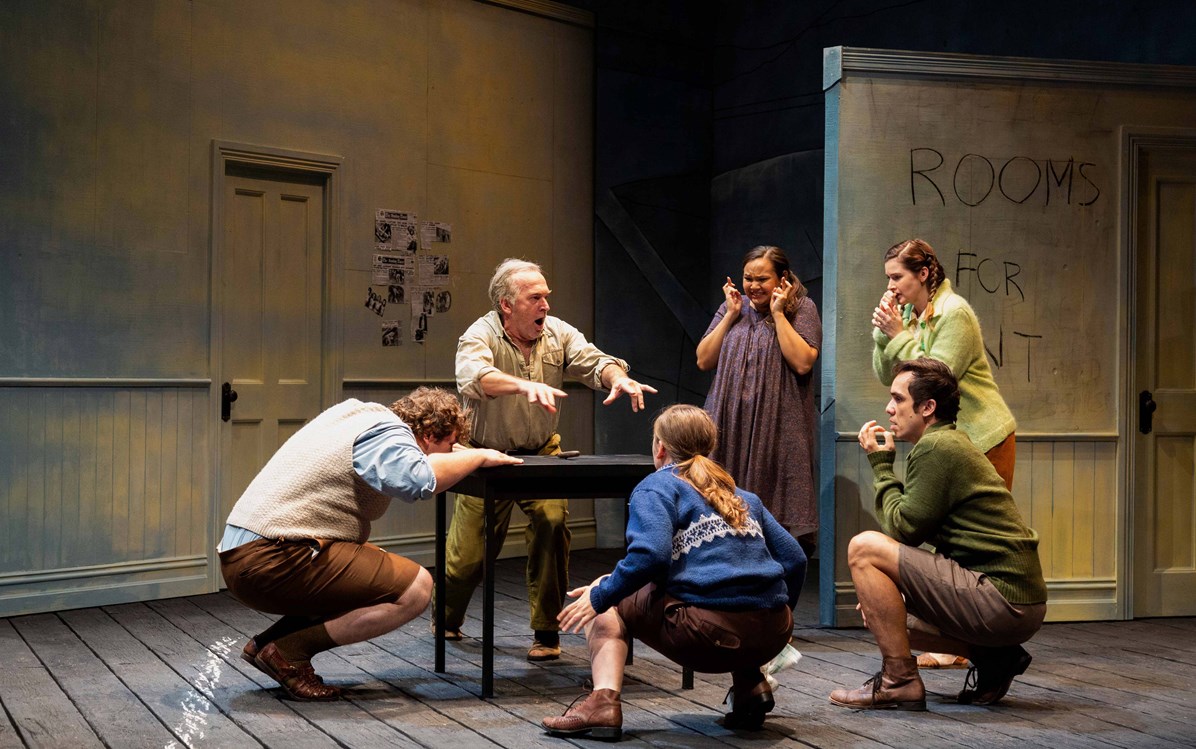Image description: on a stage, six people (three women and three men) are grouped around a dining table, in a dilapidated house. Their poses vary, but they all demonstrate trepidation, with one woman crossing her fingers for good luck. The stare at an unidentifiable, screwdriver-sized object on the table.
By Amelia Birch
I was apprehensive going into Cloudstreet. I’m not shy of a mammoth play – I eagerly sat through the National Theatre’s eight hour Angels in America in 2017 and would do it again in a heartbeat. What I hate is intervals. I loathe them, they are an absolute waste of time. The Black Swan State Theatre Company and Malthouse Theatre Company’s collab of Cloudstreet had a runtime of five hours and twenty-five minutes, with a whopping hour and forty minutes of interval time. I had my prescribed grumble beforehand, but then genuinely tried to hype myself up about it.
The Maj wasn’t packed for a first night, but the audience seemed excited, more relaxed than your standard Black Swan crowd. Despite my reservations, it felt like we were all about to embark on something pretty cool together.
For those who apparently live under a rock and so have missed absorbing the plot of Cloudstreet through cultural osmosis, the play is an adaptation of Tim Winton’s 1991 novel, which centres around two families, the Lambs and the Pickles, living together in a big, dilapidated house in Perth’s inner western suburbs from 1943-1963.
There are some truly beautiful elements of this play. Keegan Joyce’s prickly vulnerability as Quick Lamb is a definite highlight, and Brenna Harding plays Rose, the moral voice of the Pickles family, with a fierce determination. When I studied the play in Year 12, Rose was the only character I warmed to, but it’s Alison Whyte as Oriel who really grabs me in this production. Whyte’s nuanced portrayal of a mother’s crisis of faith over two decades is sensitive and aching, and I found myself looking forward to any scene where she was onstage. The theme of water is ever-present, magical realism spinning currents across the stage by means of clever work with light, sound, and occasionally real water, with weatherworn walls sliding in and out of sight like the tide. At its best, Cloudstreet is a joy to watch.
Where Cloudstreet stumbles is tricky. The inherently episodic nature of the play feels heavy-handed at times, labouring over largely unimportant plot points. By the final act, the couples next to and in front of me had not returned from the last interval, and the couple to the right of me slumped low in their seats as we struggled to care about a Nedlands murder plot that got introduced too late to be properly engaging. The repeated gunshots that sounded over and over felt more an effort to keep the audience awake than any kind of impactful device.
Ultimately, I wish that the audience had been trusted more with this play. The intervals (one was eighty minutes!? Why???) felt like an attempt to make a long play more palatable, giving us a dinner break when we didn’t ask for one. From a thrifty student perspective, I can’t help feeling bitter about having for fork out city prices for an enforced meal after already copping steep ticket and parking prices. Ensemble scenes dragged into one another, spelling minor incidents out for us where they could have just been cut and inferred in another more necessary scene. The final moments of the play are beautiful, but overshadowed by an act which left the audience itching to be out of their seats.
Listen – I didn’t have an awful evening. When Cloudstreet is good, it’s really good. Settle in, wear something comfy, and budget for dinner. It is just a shame that the length of the play feels more arbitrarily-enforced than something rewarding.
Cloudstreet runs until the 15th of March, and tickets start at $39. You can buy them here.
Three unnecessary intervals out of five.
Amelia Birch hates intervals.
Image courtesy of Perth Festival

